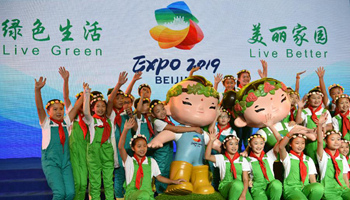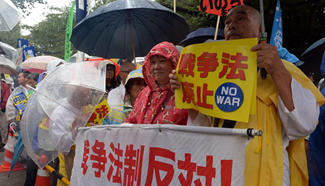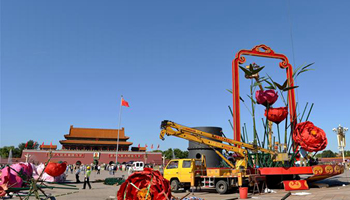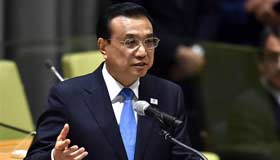BEIJING, Sept. 20 (Xinhua) -- Wang Haitao has watched the Paralympic Games in Rio de Janeiro from his wheelchair for the past week. Seeing the athletes win reminded him of his own moments on the podium.
Wang, 28, is paralyzed from the waist down due to polio. He is also an athlete. Wang has been curling for eight years as part of the Heilongjiang provincial team and the Chinese national team. The national team has won several medals in world curling championships for the disabled.
"It really impressed me when I saw some players had disabilities affecting their arms. That makes it even harder for them to participate in competitions, but they still competed with a lot of effort," Wang said.
China sent 307 athletes to the Rio Paralympics. They won 107 gold medals and 239 medals in total, leading in both counts for the fourth consecutive time. China's social media sites were flooded with praise for the Paralympic athletes and their hard work in training.
However, Zhang Haidi, president of the China Disabled Persons' Federation (CDPF), pointed out that their success also reflects improved rights and opportunities for disabled people in the country.
TACKLING POVERTY
Li Hulian, who lives in a fishing village in east China's Jiangxi Province, suffers from mental illness. Coming from a poor family, his life has been difficult, and medical expenses and tuition fees for his two children have added to the burden.
There are about 85 million disabled people in China, 70 percent of whom live in rural areas. The burden of poverty is especially heavy for them.
Since last year, Li has received sustained relief from the local government. His household is part of a poverty relief program that provides each of his children 2,000 yuan (about 300 U.S. dollars) in annual education grants. His wife attended a free training course offered by the government, which helped her get a higher-paying job. Li has also received free medication starting this year.
From 2012 to 2015, 4.96 million poor rural people with disabilities were lifted out of poverty and 3.17 million poor disabled rural residents received training, according to a government report published in June on human rights during the period.
Poverty among the disabled is not a new problem, and China has poured enormous resources into addressing it.
"Poverty is not the only difficulty for the disabled, but it is the most serious and fundamental one. Disability makes poverty a long-term problem that is serious and hard to solve," said Zheng Gongcheng, a professor who studies disability issues at Renmin University of China.
Zhang Haidi agrees. For her, solving the problem of poverty is the primary goal for the CDPF. "We will continue this work through more scientific methods and do more research to support it," she said.
ENSURING EQUALITY
In August, the central government released a plan promising greater support for the disabled and outlining ways to improve their lives over the next five years.
Apart from solving the poverty problem, the plan stresses better protection to ensure equal rights, especially in job recruitment.
Wang agrees that although progress has already been made, there are still obstacles for the disabled when searching for jobs.
"I know some disabled friends who always stay at home and have become unsociable," said Wang. "This is also a big problem for disabled people when they try to participate in society."
The five-year plan not only requires equal rights for the disabled in job recruitment, but also encourages local institutions to increase opportunities in education, recreation and sports.
Zheng said it is important not just to secure a basic living for the disabled but also to fulfill their intellectual and emotional needs through participation as equal members of society.
INCLUSIVE AND FRIENDLY
According to the statement from the CDPF, China has been building a more inclusive and friendly society for disabled people.
"Now I sometimes don't even remember that I'm disabled. It's as though we are no different from able-bodied people," Wang said.
Wang said the environment has continued to improve in recent years.
He recalled one of his team members, who is paralyzed and has to use a wheelchair-accessible bathroom. In the past, his teammate could never find accessible public toilets and had to go home to use the bathroom. Now he can easily find suitable toilets in many public places, according to Wang.
The five-year plan calls for more accessible public facilities.
"Not only are the facilities very convenient, but people are more helpful and better educated now," Wang said. "The Paralympics in Rio brought us more attention and allowed able-bodied people to get to know disabled people."
Zhang said sports for the disabled are also important for physical rehabilitation.
"We need to provide conditions for the disabled to exercise, and I hope more disabled can sit or stand up through sports, which will set them and their families free," she said.










